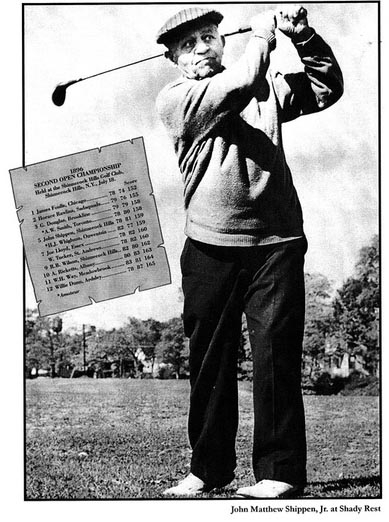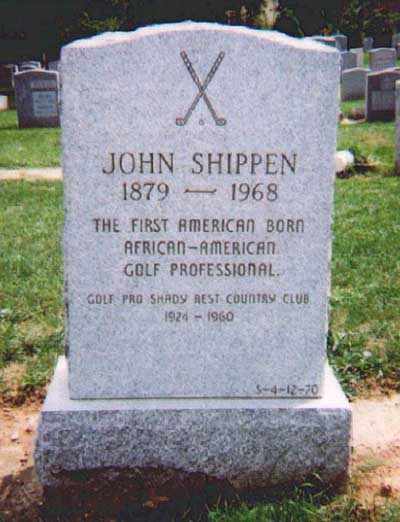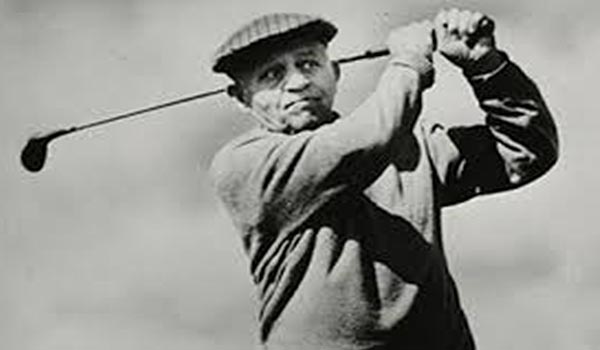BY AAGD STAFF (January 13, 2015) — The John Shippen Memorial Golf Foundation is embarking on an aggressive initiative for a U.S. Postal Stamp to honor John Matthew Shippen, Jr., the first American and the first African American to play in a U.S. Open golf tournament in 1896. Shippen (December 2, 1879 -May 20, 1968) made his career in golf and served as professional at several clubs, the last of which was Shady Rest Golf Course in New Jersey, where he worked from 1924 to 1960. As a professional, John Shippen made and sold his own clubs, which bore a stamp reading “J.M. Shippen”
 The Foundation’s Chairman Thurman P. Simmons is leading the initiative with the support of his wife, Ruby L. Simmons, who also serves as Co-Chair of the John Shippen Memorial Golf Foundation. Together, they believe the tribute stamp “would be an inspiration to students, educators and the golf community throughout the world.” Production of the stamp would also be a “fitting tribute” to African American history and the contributions which John Shippen made in the world of golf. The U.S. Postal Services receives thousands of proposals recommending subjects for a stamp, therefore, getting a new postage stamp suggestion accepted is a real challenge.
The Foundation’s Chairman Thurman P. Simmons is leading the initiative with the support of his wife, Ruby L. Simmons, who also serves as Co-Chair of the John Shippen Memorial Golf Foundation. Together, they believe the tribute stamp “would be an inspiration to students, educators and the golf community throughout the world.” Production of the stamp would also be a “fitting tribute” to African American history and the contributions which John Shippen made in the world of golf. The U.S. Postal Services receives thousands of proposals recommending subjects for a stamp, therefore, getting a new postage stamp suggestion accepted is a real challenge.
To help propel the Foundation’s request in this very important undertaking, they are asking the public to write letters in support of the initiative and mail them directly to the Citizens’ Stamp Advisory Committee. The Foundation believes that with the help of friends, family, co-workers, and others this effort will come to fruition.
Click HERE for Sample Letter (sign, date, and mail your letter to support the initiative.)
Click HERE for historical synopsis of John Shippen
The John Shippen Memorial Golf Foundation was established to commemorate the Shady Rest Golf and Country club and African American golf great, John Shippen, the club’s long-time professional and greens supervisor. Beginning as a committee in 1991, the Foundation was incorporated as a 501c non-profit foundation in 1996 with Thurman Simmons as its first Chairman.
John Matthew Shippen, Jr. was an American/African American golfer who competed in several early U.S. Opens. Shippen Jr. was born in Washington D.C.., the son of a Presbyterian minister. His father, John Matthew Shippen Sr. (1848-1902) was already married in Washington, D.C. to Ella Spotswood and together they had six children: Ruth Elizabeth Shippen, John Winfield Shippen, William Hugh Shippen, Beulah A. Shippen, Mable Snyder Shippen, and Claire Russell Shippen. When John Jr. was nine-years-old his father, Shippen Sr., was sent to serve as a minister on the Shinnecock Indian Reservation. The Reservation was located close to one of America’s earliest golf clubs, Shinnecock Hills Golf Club. After completing his ministerial post, John’s father returned to live Washington, D.C., however, John, Jr. remained on the reservation. John Jr. married twice while living on the reservation (to Native American women). John, Jr. worked as a caddy at the Shinnecock Hills Golf Club and was taught to play by the club’s Scottish professional Willie Dunn.
“We believe this effort will create a whole lot of interest because a lot of people do not know who John Shippen was,” says Thurman Simmons. “He should be in the annals of golf, because of what he did…We don’t promote it enough; and the powers that be don’t support him. They all talk about the people who came after him. He was the ‘real’ Jackie Robinson of golf when we (Blacks) were just playing football and basketball and baseball. There’s never been any golfer, Black or otherwise, that has had a U.S. postage stamp,” says Simmons. “I also believe that it would be a great selling stamp all around the world.”
“The African American Golfer’s Digest has received confirmation that our support letter has been received by the USPS and that it will be submitted for review and consideration before the Advisory Committee,” said Debert Cook, Publisher. “We hope that others will join us in this effort.
The Shinnecock Hills course was chosen to host the second U.S. Open, and the members were so impressed with Shippen’s talent for the game that they decided to pay his entry fee for the tournament, along with that of his close friend, Oscar Bunn, a Shinnecock Indian. Shippen was allowed to play because he registered as an Indian (his mother was Shinnecock) rather than as a black.
 When the professional entrants for the competition found out about this they threatened to boycott the event, but they backed down after USGA president Theodore Havemeyer stated that the tournament would proceed even if only Shippen and Dunn took part. Shippen was paired with Charles B. Macdonald, winner of the first U.S. Amateur in 1895.
When the professional entrants for the competition found out about this they threatened to boycott the event, but they backed down after USGA president Theodore Havemeyer stated that the tournament would proceed even if only Shippen and Dunn took part. Shippen was paired with Charles B. Macdonald, winner of the first U.S. Amateur in 1895.
He was tied for second place after the first of the two rounds, and remained in contention until he drove his ball onto a sandy road at the 13th hole and scored an eleven. If he had made par on that hole, he would have made a playoff for the championship, but he still finished in a tie for sixth and won $10 as the fifth-placed non-amateur. Scottish born James Foulis won the $150 first prize.
Shippen played in five more U.S. Opens, and his best finish was a tie for fifth in 1902. No other African American played in the Open until Ted Rhodes took part in 1948.
In 2009, the PGA of America granted posthumous membership to Shippen, Rhodes and Bill Spiller who were denied the opportunity to become PGA members during their professional careers. The PGA also has granted posthumous honorary membership to boxer Joe Louis.


